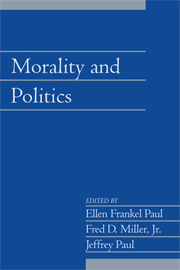Book contents
- Frontmatter
- Contents
- Introduction
- Acknowledgments
- Contributors
- What's Morality Got to Do With It? Making the Right Distinctions
- Unauthorized Humanitarian Intervention
- Thinking Constitutionally: The Problem of Deliberative Democracy
- Representing Ignorance
- Dual Citizenship and American Democracy: Patriotism, National Attachment, and National Identity
- Policy Implications of Zero Discounting: An Exploration in Politics and Morality
- Reflections on Espionage
- Mr. Pinocchio Goes to Washington: Lying in Politics
- A Subject of Distaste; An Object of Judgment
- Against Civic Schooling
- Political Morality as Convention
- Autonomy and Empathy
- God's Image and Egalitarian Politics
- Should political Liberals Be Compassionate Conservatives? Philosophical Foundations of the Faith-Based Initiative
- Index
God's Image and Egalitarian Politics
Published online by Cambridge University Press: 04 August 2010
- Frontmatter
- Contents
- Introduction
- Acknowledgments
- Contributors
- What's Morality Got to Do With It? Making the Right Distinctions
- Unauthorized Humanitarian Intervention
- Thinking Constitutionally: The Problem of Deliberative Democracy
- Representing Ignorance
- Dual Citizenship and American Democracy: Patriotism, National Attachment, and National Identity
- Policy Implications of Zero Discounting: An Exploration in Politics and Morality
- Reflections on Espionage
- Mr. Pinocchio Goes to Washington: Lying in Politics
- A Subject of Distaste; An Object of Judgment
- Against Civic Schooling
- Political Morality as Convention
- Autonomy and Empathy
- God's Image and Egalitarian Politics
- Should political Liberals Be Compassionate Conservatives? Philosophical Foundations of the Faith-Based Initiative
- Index
Summary
INTRODUCTION
These days, American politicians are loath to cite biblical passages for fear of being charged with breaching the wall between church and state. There was a time when a presidential candidate could claim that a certain monetary policy would “crucify us on a cross of gold.” This kind of rhetoric is now taboo. America's national leaders even avoid quoting the religious phrases from the Declaration of Independence, particularly its references to the “Creator” or “Nature's God.” Although in the past some of the greatest American political oratory—Abraham Lincoln at Gettysburg (1863) or Martin Luther King, Jr., at the Lincoln Memorial (1963) — relied unashamedly on biblical sources and imagery, it is no longer considered acceptable to argue publicly in the language of either the Hebrew or Christian Bibles. However religious American society might still be today, political rhetoric is noticeably nonreligious.
This is a peculiar situation, and it is hard to avoid smiling about some of the latent contradictions. Politicians are supposed to go to church or (of late) to synagogue, but they are not allowed to discuss the ideas that are elaborated inside the sanctuary. Their preferred use of these sites is to be photographed coming and going. Politicians are supposed to lead sexually moral lives, but they are not to engage in reflection or discussion about what constitutes the moral life in the Judeo-Christian tradition.
- Type
- Chapter
- Information
- Morality and Politics , pp. 310 - 321Publisher: Cambridge University PressPrint publication year: 2004

